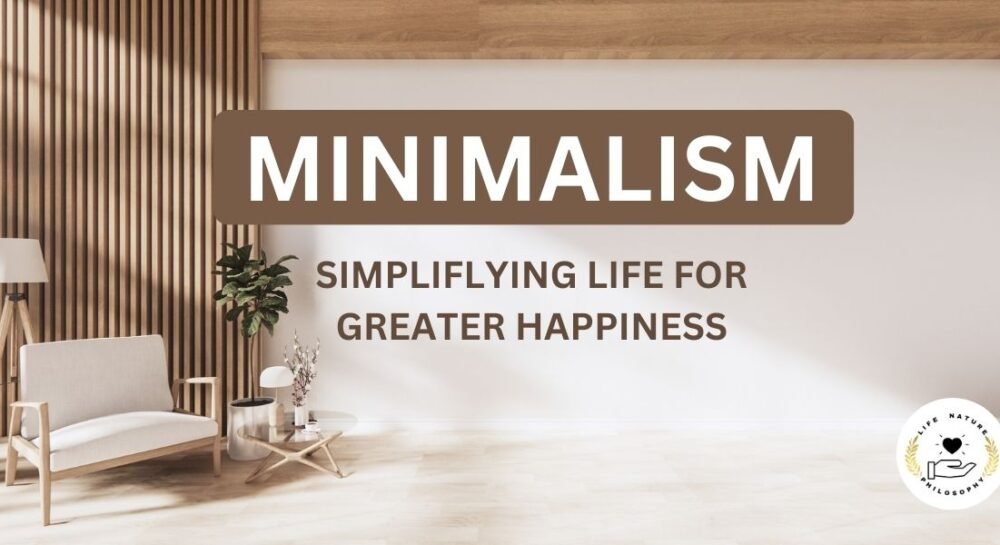In a society that encourages excess—more clothing, more toys, more obligations—it’s no wonder that we feel confused and behind the curve. Meanwhile, a subtle revolution is occurring, one that promises a clear mind, an airy home, and a blissful existence: minimalist living. At its simplest, minimalism is about living deliberately by eliminating the unnecessary to make way for the necessary. It is not about getting rid of items; minimalism is about liberation, not deprivation. By clearing your life of both mental and physical clutter, you will create space for peace, purpose, and lasting happiness.
The Philosophy of Minimalism
Minimalist living is more than the quantity of possessions we own; it is a way of thinking. The primary philosophy is intentionality, choosing to focus on what matters in your life and letting go of everything else, especially the desire to accumulate, FOMO (fear of missing out), and what society expects regarding wealth and success.
This way of life draws from many… even perspective on minimalist living, the teachings of Buddha regarding letting go and freedom from attachment, to modern design principles that stress simplicity and function. What ties all views of minimalism together is the idea of life being easier and richer when lived simply.
The Mental Clutter Trap
Many people perceive minimalism to be physically decluttering – whether that’s cleaning out the car, closets or just reducing the amount of stuff we have within reach on our shelves. We must also not forget that we can also declutter our minds, and our advancing ideas and insight as a result of minimalism could possibly not be with stuff. We live in an ever-connected, electronic-world with so many objects and events pulling our attention from many directions at once. All of the notifications, the news cycle, social media, and a full calendar can drain our minds as we deal with the clutter everyday.
Mental clutter is real – it’s not imaginary. Mental clutter can manifest itself as anxiety, stress, and indecision, and an acute sense of being overwhelmed. Minimalism focuses on curating our objects and belongings, but we also must curate our thoughts, our commitments, and our digital consumption as well.
Decluttering Your Physical Space
Decluttering your home is a profound entry point into minimalist living. It provides immediate visual clarity and often allows for extrapolated self-realizations. Take Marie Kondo’s famous method to approach decluttering by only keeping things that “spark joy”. Others prefer more actionable techniques such as a 30-day minimalism game or a one-in-one-out method.
There is no one-size-fits-all approach to achieve this, but here is a simple method to help get you started:
- Start small: Choose an area of your home, like a single drawer, a desk, or your wardrobe.
- Sort through the items and take stock: As you go through your things, assess what is purposefully and valuably yours.
- Ask yourself questions: Do I use this? Does this bring me joy? Would I buy this again today?
- Get rid of guilt-free: If these items no longer serve you, then release them. Donate, recycle, or dispose of responsibly.
- Take the things that remain and sort and organize: in a calming and meaningful way.
Physical decluttering generates a ripple effect. A clean space decreases stress levels, improves attention, and usually motivates us to start looking into the other parts of our life that may need decluttering.
Decluttering Digitally
Our devices have become new sources of clutter in today’s digital world. Digital minimalism requires a sophisticated examination of how we consume technology, and we can also use critical awareness to address our technology consumption and develop a more deliberate relationship with technology. To start, try:
- Unsubscribing from unwanted email lists.
- Deleting unnecessary files and applications.
- Turning off notifications that are not necessary.
- Taking a break from social media or limiting usage.
You may be surprised by how much mental space and space for calm you are able to open up in your world, simply by aiming to be intentional with your digital space.
Minimalism in your commitments and relationships
Minimalism is not just about things—it’s also about how we spend our time and how we spend it with. Many of us feel stretched too thin because we say “yes” too often—yes to events, yes to favors, yes to commitments that don’t align with a priority list.
Minimalist living is reminding us to:
- Focus on deep, meaningful relationships over the number of relationships.
- Learn to say “no” elegantly.
- Become more comfortable having white space in our calendars for rest, creativity, and spontaneity.
This is not about withdrawing from life, but participating in life more on your time.
The Happiness Connection
How does minimalism lead to happiness? Research in psychology and neuroscience has identified some explanations:
- Lower Stress: Clutter (and over-commitment) raises cortisol levels (the stress hormone).
- Improved Focus: Less distractions allow you to better focus on what matters most.
- Increased Gratitude: When you stop longing for the next thing and appreciate what you have, your satisfaction increases.
- More Freedom: The less you own, the less you need to care for and clean, and the more time you can devote to your passions.
The idea of minimalism is to remove what is excess so that we can realign with our values. This re-alignment gives us a richer, truer, and sustainable nature of well-being.
How to Step into Your Minimalist Life
Minimalist living doesn’t have to be all or nothing. Below are some tips on how to get started.
- Identify Your “Why”: Consider what you’re trying to achieve more of time, less stress, more space to concentrate.
- Go for the Easy Wins: Declutter in the areas of your life that feel the least emotional to you.
- Go at Your Own Pace: Minimalism isn’t a race, it’s a journey that only you are going on.
- Reflect Often: Pay attention to how you feel whenever you let go of things and commitments.
- Enjoy All Accomplishments: Each and every milestone toward a simpler life is something to celebrate.
Conclusion: Less is More
Minimalist living isn’t about making your life/run a perfectly empty space, it’s about living a life that aligns with who you really are and removing the excess, noise and expectations. By decluttering your physical space, your digital space, your mind and your calendar, we begin to grow space for happiness.
Ultimately, minimalism is about making space for the things that matter. And the thing about that is that often times joy had been there all along.



